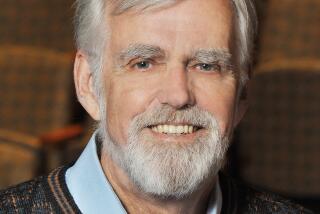‘Sisters’ with some heavy father issues
- Share via
A pompous, overwrought and itchingly claustrophobic psychodrama, “The Sisters” was adapted by Richard Alfieri from his own play, which itself was “suggested,” whatever that means, by Chekhov’s play of almost the same name. The movie transposes four morose siblings from early 20th century podunk Russia to a contemporary Manhattan college campus (because of, you know, the parallels), but instead of having them long for Moscow, the writer sets them pining for Charleston, S.C. OK, it sounds weird, but you’d long for Charleston too, even one shrouded in great billowing clouds of fake flashback fog, if you spent all your time in New York holed up in a teachers’ lounge verbally abusing friends and family under a creepy oil portrait of your dead father.
Arthur Allan Seidelman directs a star-stuffed cast that includes Maria Bello, Mary Stuart Masterson and Erika Christensen as sisters psychotic Marsha (yes, Marsha), repressed Olga and lulu Irene, and Alessandro Nivola as their lily-livered brother, Andrew. The eerily codependent siblings are flanked at all hours by Rip Torn, as their doddering family friend, Dr. Chebrin, and Chris O’Donnell and a disconcertingly angry and unkempt Eric McCormack as former friends turned dueling suitors. (They both love the coed, Irene, in the mute, mooning manner of bygone lovers.) Steven Culp plays Marsha’s despised psych professor husband, who for reasons unclear never even attempts to medicate her. Into this psychosexual morass wander Tony Goldwyn as “father’s” former assistant, Vincent, come to temporarily lift Marsha out of her misery; and Elizabeth Banks, as the no-class hussy Andrew plans to marry over his sisters’ constant, cruel and tiresome objections.
The limits and conventions that might have kept three educated young women trapped in a garrison town in 1901 don’t exactly translate to the contemporary setting. The faculty lounge isn’t the same thing as a turn-of-the-century drawing room, where unmarried upper-class girls of diminished fortunes went to die. Likewise, Andrew’s “disadvantageous” marriage (she’s a former salesgirl with a Brooklyn accent who once took an extension course) hardly warrants the buckets of vitriol Marsha dumps on her at every opportunity. And the notion of a college student in New York dutifully playing baby sister to harpy siblings is a stretch.
None of it plays, so the movie dredges up a whale of a daddy issue. Now, college professor Olga is a closeted lesbian who refuses to express her feelings, Marsha is a promiscuous basket case and Irene is a meth addict. .
Bello displays an impressive ability to spew torrents of bile, but nothing can save the actors from the painfully mannered dialogue and implausible relationships. Here’s Olga, for instance, responding in a single breath when her youngest sister confides that she thinks her fiance loves her more than she loves him: “Darling, discretion is called for even in intimate relationships. Don’t make honesty an excuse for unburdening yourself of unwanted thoughts and emotions. That’s what your sister does, and she’s a mess. What’s the truth, anyway? Sometimes it’s just the verbalization of surface insecurities and fears, but once spoken the words define our reality.”
She has a point, I guess. The reality that the words spoken in “The Sisters” define -- not to mention the slow-motion close-ups, hazy edges, flashback reverb and soapy soundtrack -- will only be recognizable to dedicated fans of the Lifetime network.
*
MPAA rating: R for language and some sexual content
An Arclight Films release. Director Arthur Allan Seidelman. Screenplay by Richard Alfieri, based on his play. Director of photography Chuy Chavez. Editor Drake Silliman. Running time: 1 hour, 53 minutes.
Exclusively at the Music Hall, 9036 Wilshire Blvd., Beverly Hills (310) 247-6869; One Colorado, 42 Miller Alley (inside plaza, Fair Oaks at Union Avenue), Pasadena (626) 744-1224.
More to Read
Only good movies
Get the Indie Focus newsletter, Mark Olsen's weekly guide to the world of cinema.
You may occasionally receive promotional content from the Los Angeles Times.










